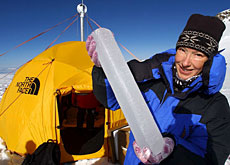Researchers unlock climate secrets

Swiss research in paleoclimatology and climate simulation is at the cutting edge of climate-related sciences worldwide, Martin Beniston tells swissinfo.
Beniston heads a research group at Geneva University on climate change and climate impacts.
swissinfo: What are the strong points of Swiss research on climate?
Martin Beniston: First of all you have up to 70 researchers in paleoclimatology who reconstruct past climates, from several hundred thousand years ago to the last century.
Thomas Stocker and others at the University of Bern have distinguished themselves several times with work carried out on ice coring, notably in Greenland and Antarctica.
Reconstructing the climates of the distant past gives us an idea of the natural variability of climate in the absence of human effects. The Swiss make a significant contribution to this important area of international research.
As for the future, several groups of researchers – up to 50 people – work on the modelling and simulation of climate evolution, particularly in reaction to the increase in greenhouse gases.
In this field, we distinguish between simulations at a global level, using planetary models and regional models for more precise and detailed research on Europe, including the Alps.
The two teams most active in this area are Professor Christoph Schär’s team at the Swiss Federal Institute of Technology in Zurich, along with ours at the University of Geneva.
Thirdly, you have several hundred researchers working on the impact of climate change. This research is varied, sometimes mono-disciplinary and more often multi-disciplinary.
swissinfo: Switzerland is one of the leading locations in paleoclimatology and climate simulation in terms of publications and participation in international programmes. Why is that?
M.B.: Before the nineties Swiss researchers were renowned for their collection of very high precision climate and paleoclimate data.
The quality of an impressive number of the data advanced our knowledge of the workings of climate and its evolution up to today. And that gave Swiss researchers a head start.
swissinfo: Swiss research is less advanced when it comes to responding or finding ways to mitigate the effects of climate change. Is there not an interest in developing its expertise in this domain?
M.B.: I’m not sure that Switzerland really is behind in that. The problem is that a subject like climate warming is global.
It is therefore necessary to work in partnership with other countries, our neighbours in the European Union first and foremost. Switzerland alone cannot do a huge amount, apart from showing the way with certain technologies, energy saving for example.
swissinfo: Does Switzerland invest enough in climate research?
M.B.: The main flagship network, the National Centres of Competence in Research, has for example lost 30 per cent of its budget. Some researchers have not been able to pursue their work. Others have seen their funding cut back. It’s all the more paradoxical at a time when problems related to climate change are constantly growing in importance.
But the situation does seem to be reversing somewhat now with the increase in research funding approved by parliament. I am a little less pessimistic for the years ahead.
swissinfo: What breakthroughs should we expect from Swiss research over the next few years?
M.B.: A lot of information will emerge from the study of paleoclimates. In the absence of human effects, the climate can suddenly distort for several years or several centuries. It did so in the past and we know more about it now.
Another area closely studied in the past two or three years is the evolution of extreme weather events such as heat waves, heavy downpours, droughts and storms.
These hazards which are the most costly in human life and economic terms, could affect the Alps since the climate is progressively warming.
swissinfo: And the people to carry out this work?
M.B.: They must be mobilised. This can be done through education, but also by ensuring young researchers have secure employment. They need it in order to broaden their expertise and become leaders.
Today unfortunately those who carry out research work are in a relatively insecure position in terms of job perspectives. Assistant positions are limited to five years and the number of professorships is very limited.
swissinfo interview: Pierre-François Besson
Swiss climate research first came to prominence in the nineteenth century with the work of Louis Agassiz, pioneer of the study of alpine glaciers. He was also the first to envisage climate changes and the succession of glacial and interglacial periods.
In the 20th century Hans Oeschger of the University of Bern made his mark on global paleoclimatology with his studies on the glaciers of Greenland, the Antarctic and the alpine arc to prove natural fluctuations in climate.
Since the 1990s in particular, Swiss research has also stood out in digital modelling and simulation of future climate evolution.
The leading institutions are the Swiss Federal Institute of Technology in Zurich (Institute for Atmospheric and Climate Science), the Universities of Bern (Institutes of Physics and Geography) and Geneva (Beniston’s group).
Other important institutions are the Paul Scherrer Institute at the University of Geneva (socio-economic impacts of climate change) and Zurich University and the Federal Institute of Research on forests, snow and countryside.

In compliance with the JTI standards
More: SWI swissinfo.ch certified by the Journalism Trust Initiative
You can find an overview of ongoing debates with our journalists here. Please join us!
If you want to start a conversation about a topic raised in this article or want to report factual errors, email us at english@swissinfo.ch.